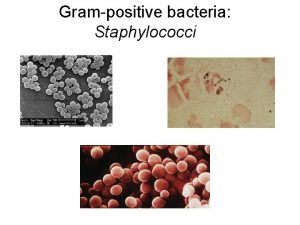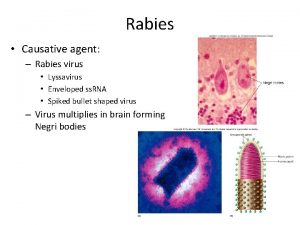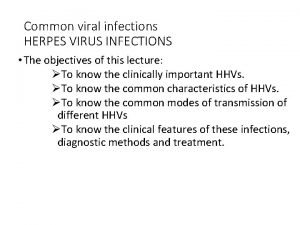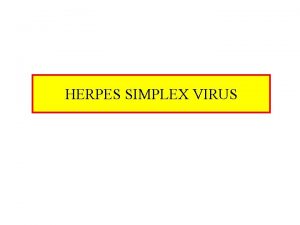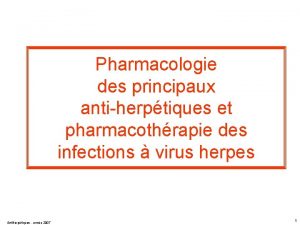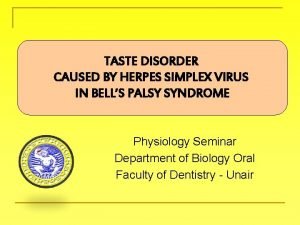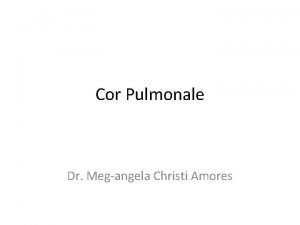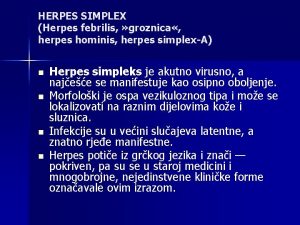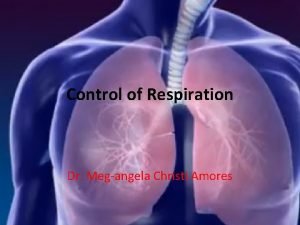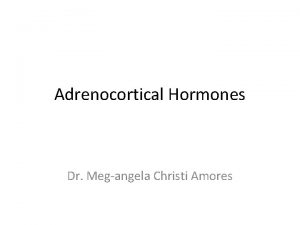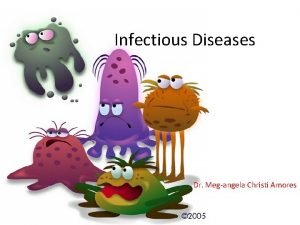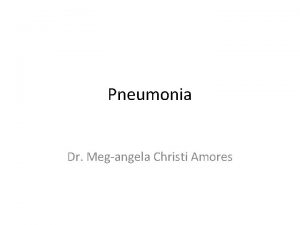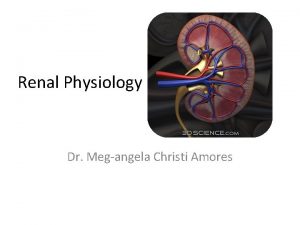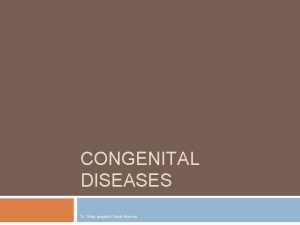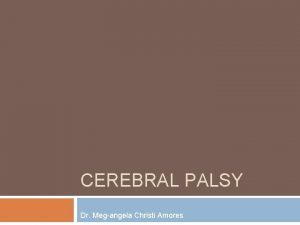Herpes Dr Megangela Christi Amores Herpes Simplex Etiologic

















- Slides: 17

Herpes Dr. Meg-angela Christi Amores

Herpes Simplex • Etiologic agent: – Herpes Simplex Virus (HSV) • DNA virus • HSV 1 and HSV 2

Herpes Simplex • Pathogenesis – Exposure to HSV at mucosal surfaces or abraded skin – Entry of virus and replication in epid and dermis – sensory or autonomic nerve endings – On entry into the neuronal cell, the virus— or, more likely, the nucleocapsid—is transported intra-axonally to the nerve cell bodies in ganglia – Contiguous spread of locally inoculated virus

Herpes Simplex • Immunity – antibody-mediated and cell-mediated – Immunocompromised patients with defects in cell -mediated immunity experience more severe and more extensive HSV infections

Clinical Spectrum • clinical manifestations and course of HSV infection depend on the anatomic site involved, the age and immune status of the host, and the antigenic type of the virus • incubation period ranges from 1 to 26 days (median, 6– 8 days) • Both viral subtypes can cause genital and oralfacial infections

Oral-facial Infection • Gingivostomatitis and pharyngitis – most common clinical manifestations of first-episode HSV-1 infection – among children and young adults – fever, malaise, myalgias, inability to eat, irritability, and cervical adenopathy, may last 3– 14 days – Lesions may involve the hard and soft palate, gingiva, tongue, lip, and facial area

Oral-Facial Infection • recurrent herpes labialis – most common clinical manifestation of reactivation HSV-1 infection • HSV-1 and varicella-zoster virus (VZV) have been implicated in the etiology of Bell's palsy (flaccid paralysis of the mandibular portion of the facial nerve).

Genital Infection • First episode: – fever, headache, malaise, and myalgias – Pain, itching, dysuria, vaginal and urethral discharge, and tender inguinal lymphadenopathy – Widely spaced bilateral lesions of the external genitalia – Lesions varied: vesicles, pustules, or painful erythematous ulcers – HSV 2 recurs more

Genital Infection • Both HSV-1 and HSV-2 can cause symptomatic or asymptomatic rectal and perianal infections. • subclinical perianal shedding of HSV is detected in women and men who report no rectal intercourse • anorectal pain, anorectal discharge, tenesmus, and constipation

Other areas • Herpetic whitlow—HSV infection of the finger – may occur as a complication of primary oral or genital herpes by inoculation of virus or – direct introduction of virus into the hand through occupational or some other type of exposure – abrupt-onset edema, erythema, and localized tenderness of the infected finger – Vesicular or pustular lesions of the fingertip – Fever, lymphadenitis, and epitrochlear and axillary lymphadenopathy

Other areas • Herpes gladiatorum – Common among wrestlers – HSV infections of the thorax, ears, face, and hands – facilitated by trauma to the skin sustained during wrestling

Other areas • Eye Infection – most common cause of corneal blindness in the United States – acute onset of pain, blurred vision, chemosis, conjunctivitis, and characteristic dendritic lesions of the cornea

• Central and Peripheral Nervous System infections – accounts for 10– 20% of all cases of sporadic viral encephalitis

Management • Diagnosis – clinical and laboratory – characteristic multiple vesicular lesions on an erythematous base – detection of virus, viral antigen, or viral DNA – PCR

Management • Treatment – mucocutaneous infections: Acyclovir – topical use in HSV eye infections: idoxuridine, trifluorothymidine, topical vidarabine, and cidofovir – encephalitis and neonatal herpes, IV acyclovir

Management • Acyclovir is the agent most frequently used for the treatment of HSV infections and is available in IV, oral, and topical formulations. • acyclovir, valacyclovir, and famciclovir – effective in shortening the duration of symptoms and lesions of mucocutaneous HSV infections

Management • Prevention – Barrier forms of contraception (especially condoms) decrease the likelihood of transmission of HSV infection – When lesions are present, HSV infection may be transmitted by skin-to-skin contact despite the use of a condom
 Atypical bacteria
Atypical bacteria Rabies causative agent
Rabies causative agent Herpes simplex virus 2
Herpes simplex virus 2 Aciclovir varicela copii
Aciclovir varicela copii Herpes simplex
Herpes simplex Virus herpes simplex de type 2
Virus herpes simplex de type 2 Herpes simplex virus
Herpes simplex virus Stylomastoideus
Stylomastoideus Ei ardoca resumo
Ei ardoca resumo Pregonadas son las guerras de francia con aragón
Pregonadas son las guerras de francia con aragón Marina amores
Marina amores Canciones de vendimia
Canciones de vendimia Existem 3 amores na vida
Existem 3 amores na vida “obras son amores, que no buenas razones.”
“obras son amores, que no buenas razones.” Hola hola mis amores
Hola hola mis amores Cor pulmonale
Cor pulmonale Puerto rico patria mia la tierra de mis amores
Puerto rico patria mia la tierra de mis amores Amanda amores biography
Amanda amores biography
